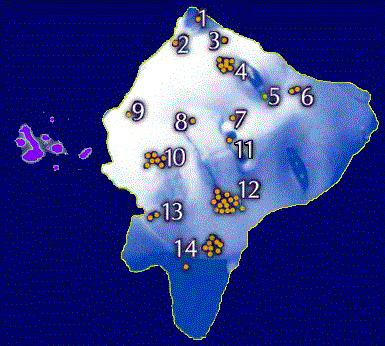URBANIZATION, POVERTY, AND CHILDREN IN LATIN AMERICA
Ecuador: Case Study
Colin Mathewson
Program locations: Throughout Ecuador (see map below)

Highlighted program: Tierra de Hombres, Quito
Program services:
Tierra de Hombres has devoted its resources for the last twenty years to preventing children from living and working on the streets outside Quito. It is located in the poor Toctiuco neighborhood south of Quito in order to identify and help children when they first begin to move out onto the streets, and before they migrate to the city core. The program provides vocational training and mentorship to children at risk of spending their lives on the street.
Approximate number of children served:
Since this program focuses on one neighborhood outside of Quito and engages in substantial individual attention and training with each child participant, the program probably serves less than fifty different children at any point in time.
Characteristics of children served:
Children in the program come from a poor area hastily constructed on the outskirts of Quito. Many of these children live in broken families. Eduardo Torres, one successful "graduate" of the program, remembered that "there were always many problems in my family; everything was solved with arguments and sometimes beatings. My two older brothers had already left home and I never knew what happened to them." By eight years old he had already spent a good deal of time on the streets. Now, at age seventeen, Eduardo is training to pursue his dream of opening his own car garage today with help from the program.
How children are selected:
Children are selected on the basis of their personal probability to spend their lives on the streets, as well as their willingness to participate and commit to the program.
Sponsorship of foundation:
The International Youth Foundation (IYF), a NGO founded in 1990 that focuses on a broad spectrum of youth issues around the world, provides financial support and capacity-building services to Fundación Esquel. This partnership gives the Fundación the financial freedom and organizational capacity to pursue its mission in Ecuador. In the next three years, the IYF will give the Fundación over one million dollars.
History of foundation:
The Fundación was established on August 31, 1990, and since its inception
it has funded more than 250 projects and directly involved more than 500,000
citizens in its service efforts. Its current funding arenas include the Children
and Youth Development Program, the Economic and Social Development Program,
and the Sustainable Human Development Program. The
Fundación has been recognized nationally and internationally as one of
the most consistent and efficient civil organizations in Ecuador. Its Board
of Directors is comprised by a majority of business leaders with connections
to the Quito Stock Market, international corporations, and the mass media.
Financial basis of foundation:
The Fundación receives a large amount of financial support from the International Youth Program with few constraining strings attached. In addition, the fact that the Fundaciónís Board is inextricably tied to the successful corporations in Guayaquil and Quito lends credibility to the assumption that the Fundación receives substantial support from Ecuadorís private sector.
Philosophy of foundation:
Grounded in the vision of development rooted in the will of the citizens engaged in the process, the Fundación funds programs that build the capacity of residents to make substantive changes in their own lives. The Fundación also emphasizes the importance of constructing a network of civil organizations, government agencies, and businesses to strengthen Ecuadorís potential to address collectively societyís pressing problems.
Special features of foundation:
The Fundaciónís partnership with the International Youth Foundation adds a powerful international perspective and legitimacy to the Ecuadorian foundation. It also embraces a refreshing philosophy of understanding that the people themselves know best how to help themselves. This leads the Fundación to continually fund programs that give citizens the chance to change their own lives, without the "help" of removed technical planners that "know" the "right" way to "solve" community problems.